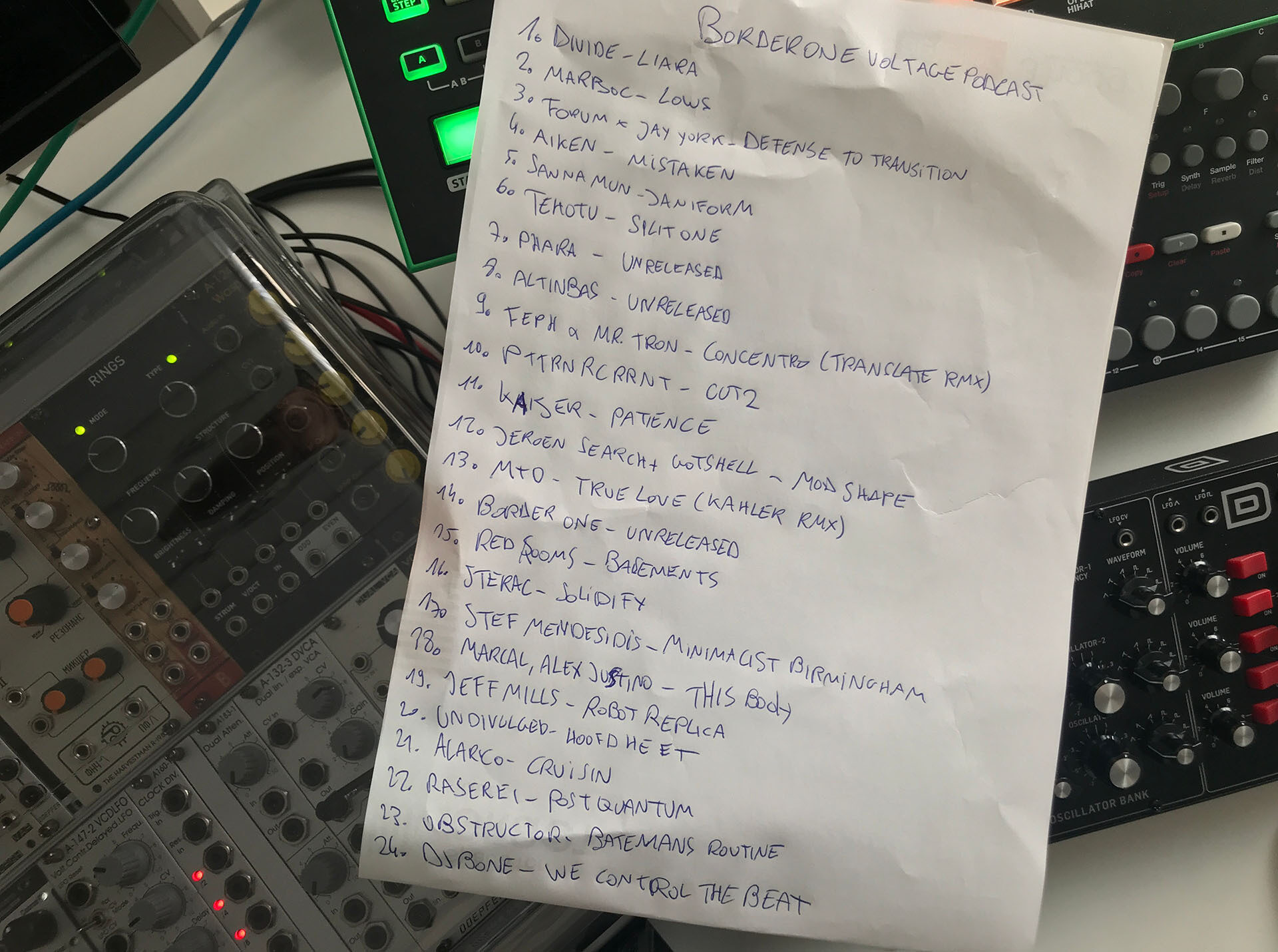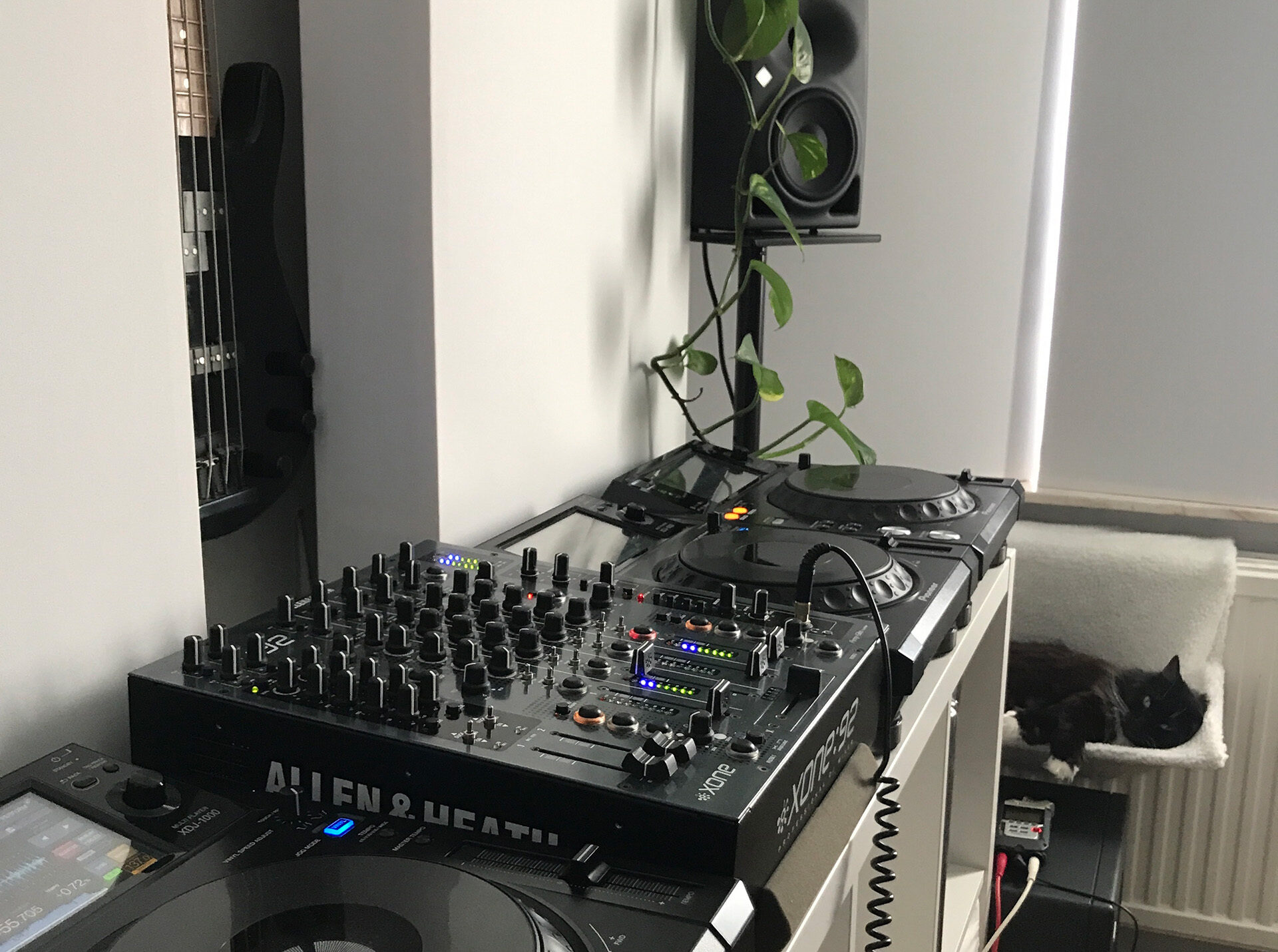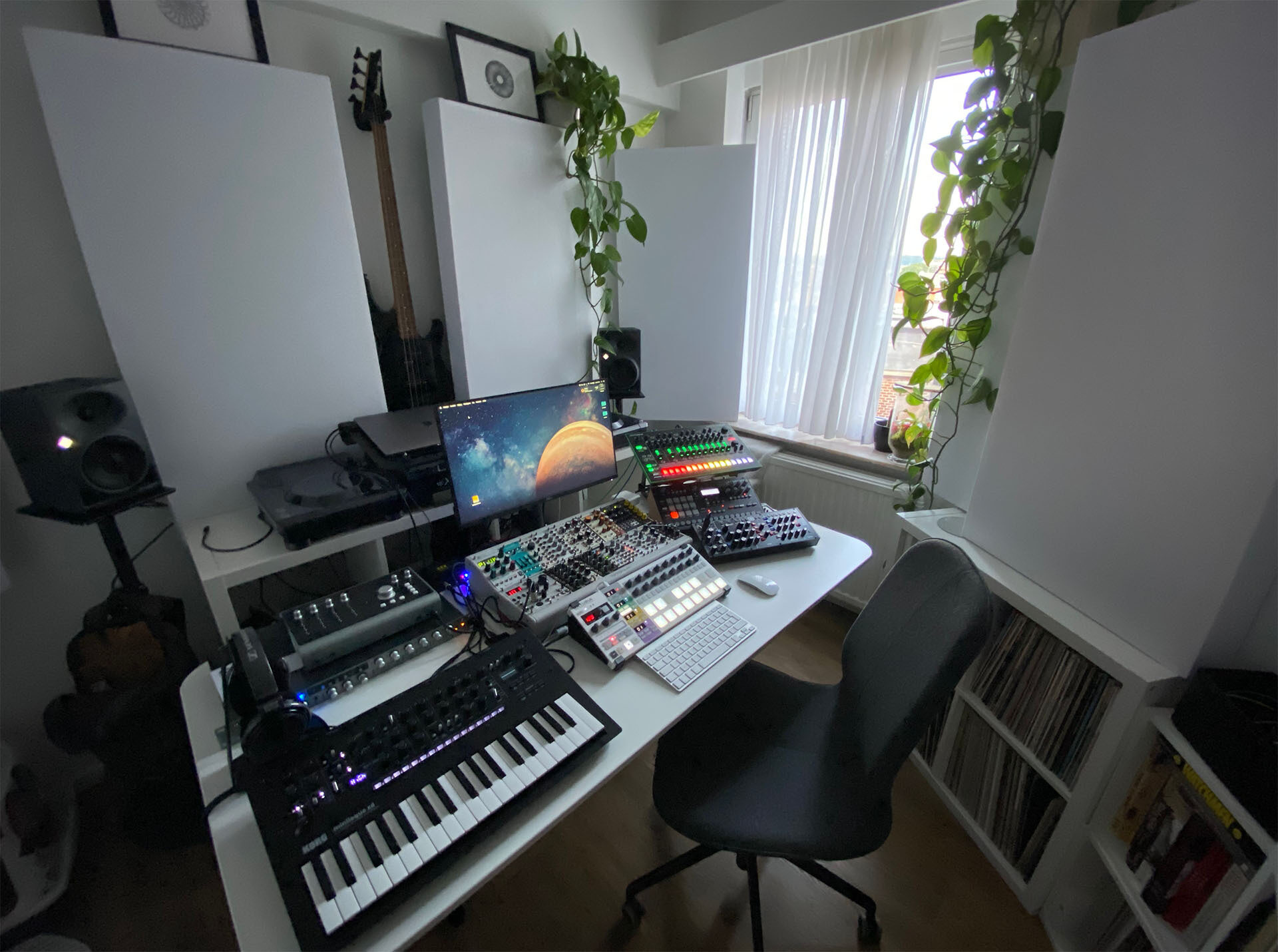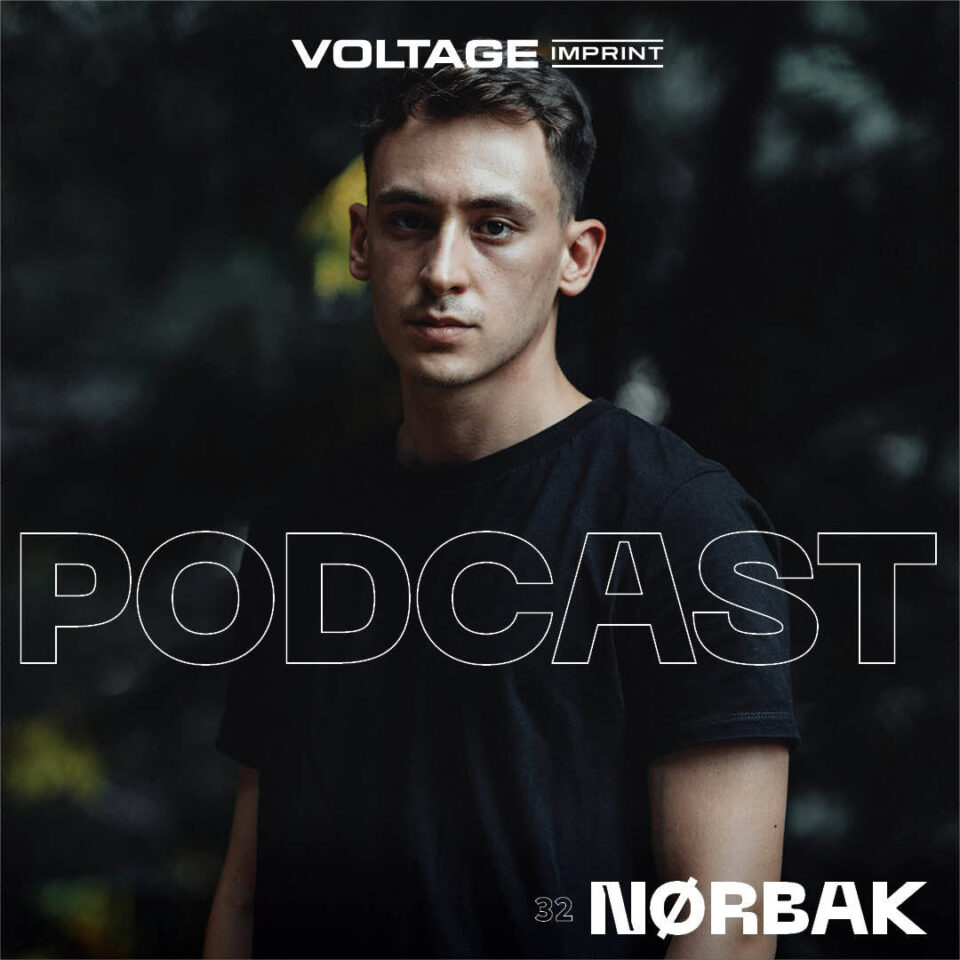VOLTAGE Podcast 34 - Border One

Tracklist
- Divide - Liara
- Marboc - Lows
- FORUM x Jay York - Defense To Transition
- Aiken - Mistaken
- Sanna Mun - Janiform
- Tehotu - Split One
- Phara - Unreleased
- Altinbas - Unreleased
- Feph & Mr. Tron - Concentro (Translate remix)
- PTTRNRCRRNT - CUT2
- Kaiser - Patience
- Jeroen Search, Gotshell - Mod Shape
- MTD - True Love (Kalher remix)
- Border One - Unreleased
- Red Rooms - Basements
- Sterac - Solidify
- Stef Mendesidis - Minimalist Birmingham
- Marcal, Alex Justino - This Body
- Jeff Mills - Robot Replica
- Undivulged - Hoofd Heet
- Alarico - Cruisin
- Raserei - Post Quantum
- Obstructor - Batemans_Routine
- DJ Bone - We Control The Beat
Originally from Zottegem in Belgium, Steven Petit is widely regarded as a main player in the Belgian scene for his DJ sets, live shows, and productions. Having grown up in a small town, Petit unsurprisingly moved to one of Belgium’s cultural capitals : Ghent, where he created much of what he is known for today.
It was at 9 years old that he beatmatched his first two records, launching a lifelong love for dance music that has seen him across very impressive stages all across Europe. Collecting records to spin, starting with the Detroit pioneers thanks to an involved older brother,
Petit picked up producing later and quickly developed his signature.
A singular, rooted sound has amassed a very impressive back catalog with releases on Token, SK-X, Key Vinyl, and many others including his own Border One Records. Sophisticated in design and effective in practice, these records have given Petit a reputation as a sure shot artist to play in clubs. Minimal elements take space in his cuts and are smeared out to ensure tense blends perfect for mixes, explaining why his tracks have been played by some of the world’s greatest artists in the genre and by himself in his new base Brussels.
Interview
Take us through your past - where exactly are you from?
I’m originally from a small town called Zottegem, I grew up there and I moved to Ghent at nineteen or twenty, lived there for eight or nine years and now I’ve been in Brussels for about two years. Zottegem is a really small town. I just grew up and went to school there and when I started going out more I went to Ghent a lot on the weekends. At a certain point I just thought, yeah I’ll just move there… I just moved there basically to party. [laughs]
Growing up in Zottegem, what kind of music were you listening to and how were you introduced to techno?
As a kid, I was always interested in my parent’s record collection. I was really open to listening to a lot of genres at that age and I was lucky to have a brother who’s about seven years older than me. He showed me a lot of music and started going out at about sixteen getting into techno and trance in the mid-nineties. He was listening to all of that and since I looked up to him, I thought if he thinks that’s cool, I’m going to listen to that as well [laughs]. He also started DJing at some point, which is also where I got my interest in that.
He taught me how to DJ, I think I was 9 years old when I beat matched my first vinyls. He ended up selling all his gear at one point and I really wanted to DJ but I had no money to buy the gear. There was a gap of two or three years to get the money to buy everything and I started Djing after that. I was influenced by the music my brother listened to and that was the early techno giants like Jeff Mills and Robert Hood… even some of the trance that was big in that time.
That’s funny, you can’t really hear the trance influence in your music.
Yeah, I don’t think it was my favorite kind of music back then. I just went more to the techno side of things. Also, when I started going out, there wasn’t that much trance anymore. I always really felt connected to techno, especially to the Detroit, soulful techno stuff.
So, from there, how did you get into producing and gigging?
I started making music on a groovebox, the Roland MC303. It has drums and synths and everything in it, so you can make full tracks with it. I bought it just for fun at about seventeen or eighteen, to see how to make music. I was really addicted to that piece of gear, I was making music every day with that thing. I still have, somewhere, a CD of tracks I made with it and they all suck, of course [laughs].
I really had fun making them and, back then, a friend told me about Ableton. At first I didn’t want to use a computer to make music, I was hesitating to learn the software. He showed me once and I thought it could be cool, so I started using Ableton. It took a long time to learn it, I did it all by myself. I don’t think there were many YouTube tutorials back then… so it took a while to be able to make tracks that were listenable to other people.
How did the transition into becoming Border One come about? Where did you get the name and concept?
I actually started DJing under the name Stevie P, derived from my real name. I also produced under that name and released even on vinyl. My first track I released on vinyl under the Stevie P name was called Border One, so that’s how I eventually chose the name Border One. When I was ready to change a bit of my profile and was more certain of how my sound was at that point, I switched names.
What marks the difference between this past alias and the new one?
I think with the Stevie P alias I was still kind of a kid. I was just messing around with music, not taking it that seriously, but at some point I wanted to release on bigger labels. I felt, while sending demos with the name Stevie P, that labels were not taking me seriously or even just not listening because the name doesn’t sound techno or something. That was the point where I decided to change names and send tracks as Border One.
What do you consider to be your first ‘real’ gig?
It’s hard.. I would have to check all my old flyers. I played a lot at a local pub in Zottegem, but I wouldn’t really consider one of those gigs as something cool I wanted to do all the time. One gig that comes up is here in Brussels, I think it was even my first time in Brussels, but I was still playing as Stevie P. It was a party organized by Jean Ny (Neila)... I don’t remember where it was but it was in a super small basement that got really hot. That was a really nice party where I felt like the crowd was really into it.
It was totally different from Ghent, where I was already playing a lot. There were always a lot of students in Ghent that weren’t always there for the music. With that party in Brussels, we felt like people were there for the music and were into the DJs that were playing. Kafim also played that night.. might have been 2010.
Fast forward after all these years and you’ve played big clubs all around Europe. Is there somewhere you’d still like to discover?
I would love to go to Tokyo and see the scene over there. I have a big interest in Japan. Festivals like Labyrinth and Rural seem super nice. Nobu told me there’s a lot of people playing my music out there, so it would be nice to check it all out. Berghain too, of course. I’ve been there a lot but I’ve never played. Also, I’d love to see the Tel Aviv scene, especially The Block. I’ve heard great things about it and would love to play there once.
Moving back to production and your records, you’ve released on SK-X, Token, Key Vinyl… which record of yours reflects your sound and intention the best, which one of these is your favorite?
I think maybe my very first Border One record, my Bittersharp EP on Wolfskuil Records. It means a lot to me because it’s my first Border One record and I still like it myself. The thing is I was messing around and not thinking too much about the process, I was having fun. Now, if I feel lost in the studio, I think about those tracks and having fun. Not thinking too much about making the music, just doing it. It’s the same with DJing, if you think too much about it then you get lost. That record really means a lot to me.
You relatively recently moved from Ghent back to Brussels.. Having released on a good number of international imprints, have you thought about leaving the country and going to a larger scene?
Now that I live in Brussels, I really feel good here. I really feel like a part of the scene here, which is nice. I know pretty much all the DJs and producers here that I want to know and we all get along really well. Many years ago, I thought about moving to Berlin, but I think it’s hard to live there now. I like to keep it as a place to go for partying.
Your own Border One Records releases have also been quite popular, the last record you did there was closing in on two years ago, do you have any plans to rerelease there in the near future? Have you considered putting out anyone else’s records on your imprint?
The reason it’s taking so long for the third release is because of the pandemic and not having so many gigs and money to put into it. Now I have some money inside to reinvest into it. I have some tracks for it too, but I think it’s really hard to pick the music for your own label. If you want to release on another label, you just send over a bunch of tracks and they pick them. You trust the label owner will pick out good tracks and make a good EP, but if you have to do it yourself it’s a bit harder.
Of course, I ask friends and see which tracks fit together. It’s hard but it’s still super fun. I’m working with a friend who does the artwork and I’m waiting for him to finish it, so once I have everything ready I’ll be planning the third release. But yeah, it’ll take a while for it to get released because of the pressing plant delays.
Have you considered putting out anyone else’s records on your imprint?
It will probably ever be my own music, which is why I called it Border One Records. It would be cool to release other people’s music, but I want to keep this label for my own music. It’s hard work to run a label.
So you’d consider maybe starting a label or maybe a series? Because that’s, for example, what Setaoc Mass did for SK, it started for self release and then the X series was to bring other talent.
Yeah, maybe, who knows? I won’t exclude it. If it comes up and I have the money and the music of course. There’s a lot of great artists right now. Good new techno coming out.
Which artist(s) are most exciting to you these days inside and outside techno?
Looking at my playlists on Aslice, I’m playing a lot of Altinbas. I love Ahmet’s music, he’s a super nice guy and his tracks are really nice - he can keep the funk in it and that’s really important to me. He has a lot of sides, I think he can do anything. His upcoming release on [...] - I’m a huge fan. I play it in all of my sets, at least one of the tracks. But I think it’s only coming out next year.
Outside of techno, I recently discovered the Birmingham-based duo called Zyggurat. I’m into modular and jazz; this guy plays on a modular synth and his friend plays the drums and it sounds super nice. It’s like a sort of modern, electronic outer-space jazz- so right up my alley.
Do you have anything coming up you’d like to share with us?
Release-wise, I’m doing two tracks on two separate VA’s. One is on Kaiser’s label KSR and the other is on Cogo Records, a lesser known label from Slovenia; they already have a VA with Inigo Kennedy, Stanislav Tolkachev, and others. They’re really nice guys, they kind of had to convince me a bit to do the VA, but yeah I’m going to do it and it’ll be out on vinyl.
I’ll be putting out a 4-track EP on VOLTAGE by the end of this year. And of course, the Border One Records somewhere next year. I also keep sending Kr!z tracks for Token, I love working with him.
In terms of gigs, not so much. I have the Anomalie VOLTAGE showcase in Berlin, XRDS Festival, and I’m playing in Italy somewhere in December. It’ll be my first time playing in Italy.
Next up: DJ Spit
Editorial Team: Noah Hocker and Michiel Demeulemeester
Interview: Noah Hocker





